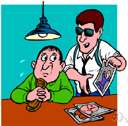trivially
Also found in: Thesaurus, Legal, Encyclopedia.
triv·i·al
(trĭv′ē-əl)adj.
1. Of little significance or value.
2. Concerned with or involving unimportant matters; superficial: a trivial colleague; a trivial remark.
3. Mathematics
a. Of, relating to, or being the solution of an equation in which every variable is equal to zero.
b. Of, relating to, or being the simplest possible case; self-evident.
[Middle English trivialle, of the trivium (from Medieval Latin triviālis, from trivium, trivium; see trivium) and Latin triviālis, ordinary (from trivium, crossroads).]
triv′i·al·ly adv.
Synonyms: trivial, trifling, paltry, petty, picayune
These adjectives all apply to what is unimportant and of little consequence. Trivial and trifling refer to what is so insignificant as to be utterly commonplace or unremarkable: "Both sides appreciated that behind this apparently trivial matter of naval salutes lay weighty issues of sovereignty at sea" (Simon Schama)."Now he was smitten with compunction, yet irritated that so trifling an omission should be stored up against him after nearly two years of marriage" (Edith Wharton).
Paltry describes what falls so far short of what is required or desired that it arouses contempt: "The mere fact of grave issues in life depending on such paltry things is monstrously ludicrous" (George Gissing).
Petty usually refers to what is of minor or lesser significance: "Religious slurs, temper tantrums, insults, coercion, debt: all petty things, really, irritants—too minor, it would seem, to move five reasonable people to murder" (Donna Tartt).
What is picayune is of negligible value or importance: "Everything was numbers-oriented—better to close out thirty-five picayune cases than go after two quality ones" (Selwyn Raab).
These adjectives all apply to what is unimportant and of little consequence. Trivial and trifling refer to what is so insignificant as to be utterly commonplace or unremarkable: "Both sides appreciated that behind this apparently trivial matter of naval salutes lay weighty issues of sovereignty at sea" (Simon Schama)."Now he was smitten with compunction, yet irritated that so trifling an omission should be stored up against him after nearly two years of marriage" (Edith Wharton).
Paltry describes what falls so far short of what is required or desired that it arouses contempt: "The mere fact of grave issues in life depending on such paltry things is monstrously ludicrous" (George Gissing).
Petty usually refers to what is of minor or lesser significance: "Religious slurs, temper tantrums, insults, coercion, debt: all petty things, really, irritants—too minor, it would seem, to move five reasonable people to murder" (Donna Tartt).
What is picayune is of negligible value or importance: "Everything was numbers-oriented—better to close out thirty-five picayune cases than go after two quality ones" (Selwyn Raab).
Word History: The word trivial entered Middle English with senses quite different from its most common contemporary ones. We find in a work from 1432-50 mention of the "arte trivialle," an allusion to the three liberal arts that made up the trivium, the lower division of the seven liberal arts taught in medieval universities—grammar, rhetoric, and logic. The history of trivial goes back to the Latin word trivium, formed from the prefix tri-, "three," and via, "road." Trivium thus meant "the meeting place of three roads, especially as a place of public resort." The publicness of such a place also gave the word a pejorative sense that we express in the phrase the gutter, as in "His manners were formed in the gutter." The Latin adjective triviālis, derived from trivium, thus meant "appropriate to the street corner, commonplace, vulgar." Trivial is first recorded in English with a sense identical to that of triviālis in 1589. Shortly after that trivial is recorded in the sense most familiar to us, "of little importance or significance," making it a word now used of things less weighty than grammar, rhetoric, and logic.
American Heritage® Dictionary of the English Language, Fifth Edition. Copyright © 2016 by Houghton Mifflin Harcourt Publishing Company. Published by Houghton Mifflin Harcourt Publishing Company. All rights reserved.
ThesaurusAntonymsRelated WordsSynonymsLegend:
Switch to new thesaurus
| Adv. | 1. |  trivially - with little effort; "we can prove trivially that this theorem is false" trivially - with little effort; "we can prove trivially that this theorem is false" |
| 2. | trivially - in a frivolously trivial manner; "trivially motivated requests" |
Based on WordNet 3.0, Farlex clipart collection. © 2003-2012 Princeton University, Farlex Inc.
Translations
بِتفاهَه، بصورةٍ ضَئيلَه
povrchně
ómerkilega
önemsiz şekilde
Collins Spanish Dictionary - Complete and Unabridged 8th Edition 2005 © William Collins Sons & Co. Ltd. 1971, 1988 © HarperCollins Publishers 1992, 1993, 1996, 1997, 2000, 2003, 2005
trivia
(ˈtriviə) noun plural unimportant matters or details. I haven't time to worry about such trivia.
ˈtrivial adjective1. of very little importance. trivial details.
2. (especially of people) only interested in unimportant things; not at all serious. She's a very trivial person.
ˈtrivially adverbˌtriviˈality (-ˈa-) noun
1. the state of being trivial.
2. (plural triviˈalities) something which is trivial. He is always worrying about some triviality or other.
Kernerman English Multilingual Dictionary © 2006-2013 K Dictionaries Ltd.